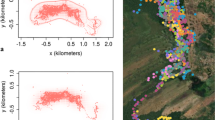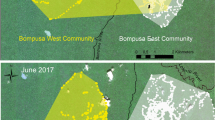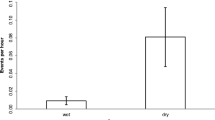Abstract
Habitat-wide depletion of food leads to scramble feeding competition and animals can mitigate costs with behavioral adjustments in ranging and activity budgets. In seasonal environments, scramble feeding competition may be more intense in lean seasons leading to shifts in the ranges of neighboring groups and cascading changes for other types of competition. Here, we specifically investigated the interplay between within-group scramble (WGS) and between-group contest competition (BGC) using four groups of ursine colobus monkeys (Colobus vellerosus) at Boabeng-Fiema, Ghana. These groups were known to be impacted by WGS and our first goal was to assess whether this competition was occurring in both the abundant and lean seasons. Within-season, between-group comparisons showed WGS in both seasons but greater behavioral compensation in the lean season, especially for larger groups. We then focused on differences in ranging behavior within groups, between seasons to examine whether greater WGS in the lean season influenced the intensity of BGC (rates and “wins” of between-group encounters). The largest and the smallest groups entered more trees and ranged slightly further per day in the lean season suggesting stronger WGS. These two groups also faced more between-group encounters with the small uni-male group winning more often in the lean season. Both middle-sized multi-male groups shifted their ranging towards the edge of the fragment in the lean season. They also engaged in fewer between-group encounters, which they usually lost. This study demonstrates the interplay between different types of competition. It also confirms that male membership disproportionately influence group competitiveness in C. vellerosus.
Significance statement
Animals face different forms of competition over limited resources every day but the ways that these competition types influence one another is rarely studied. We focused on within-group scramble competition (WGS) for food in four groups of ursine colobus monkeys and examined how seasonal changes in this type of competition influenced between-group contest competition (BGC). We found that the lean season for food availability showed greater WGS, and that animals compensated for this by using more of their home range. Some highly competitive groups were able to move into shared areas with other groups in the lean season, winning encounters with other groups, while groups with poor competitive ability were forced to range into lower quality areas and avoided other groups. Thus, WGS had cascading effects leading to changes in BGC, showing the importance of studying different types of competition collectively.




Similar content being viewed by others
References
Altmann J (1974) Observational study of behaviour: sampling methods. Behaviour 49(3):227–267. https://doi.org/10.1163/156853974X00534
Arseneau TJM, Taucher AL, van Schaik CP, Willems EP (2015) Male monkeys fight in between-group conflicts as protective parents and reluctant recruits. Anim Behav 110:39–50. https://doi.org/10.1016/j.anbehav.2015.09.006
Benadi G, Fichtel C, Kappeler P (2008) Intergroup relations and home range use in Verreaux’s sifaka (Propithecus verreauxi). Am J Primatol 70(10):956–965. https://doi.org/10.1002/ajp.20588
Bernstein IS (2011) Social mechanisms in the control of primate aggression. In: Campbell CJ, Fuentes A, MacKinnon KC, Bearder SK, Stumpf RM (eds) Primates in perspective, 2nd edn. Oxford University Press, New York, pp 562–571
Borries C, Larney E, Lu A, Ossi K, Koenig A (2008) Costs of group size: lower developmental and reproductive rates in larger groups of leaf monkeys. Behav Ecol 19(6):1186–1191. https://doi.org/10.1093/beheco/arn088
Cameron TC, Wearing HJ, Rohani P, Sait SM (2006) Two-species asymmetric competition: effects of age structure on intra- and interspecific interactions. J Anim Ecol 76:83–93
Chapman CA, Chapman LJ (2000a) Determinants of group size in social primates: the importance of travel costs. In: Boinski S, Garber PA (eds) Group movement in social primates and other animals: patterns, processes and cognitive implications. University of Chicago Press, Chicago, pp 24–42
Chapman CA, Chapman LJ (2000b) Constraints on group size in red colobus and red-tailed guenons: examining the generality of the ecological constraints model. Int J Primatol 21(4):565–585. https://doi.org/10.1023/A:1005557002854
Cheney DL (1987) Interactions and relationships between groups. In: Smuts BB, Cheney DL, Seyfarth RM, Wrangham RW, Struhsaker TT (eds) Primate societies. University of Chicago Press, Chicago, pp 267–281
Clark CW, Mangel M (1986) The evolutionary advantages of group foraging. Theor Popul Biol 30(1):45–75. https://doi.org/10.1016/0040-5809(86)90024-9
Cooper MA, Aureli F, Singh M (2004) Between-group encounters among bonnet macaques (Macaca radiata). Behav Ecol Sociobiol 56:217–227
Cords M (2004) When are there influxes in blue monkey groups? In: Glenn ME, Cords M (eds) The guenons: diversity and adaptation in African monkeys. Springer, US, pp 189–201. https://doi.org/10.1007/0-306-48417-X_14
Crofoot MC, Gilby IC, Wikelski MC, Kays RW (2008) Interaction location outweighs the competitive advantage of numerical superiority in Cebus capucinus intergroup contests. Proc Nat Acad Sci 105(2):577–581. https://doi.org/10.1073/pnas.0707749105
de Ruiter JR (1986) The influence of group size on predator scanning and foraging behavior in wedge-capped capuchins. Behaviour 98(1):240–258. https://doi.org/10.1163/156853986X00982
Dunbar RIM (1991) Functional significance of social grooming in primates. Folia Primatol 57(3):121–131. https://doi.org/10.1159/000156574
Dunbar RIM, Korstjens AH, Lehmann J (2009) Time as an ecological constraint. Biol Rev 84(3):413–429. https://doi.org/10.1111/j.1469-185X.2009.00080.x
Emlen ST, Oring LW (1977) Ecology, sexual selection, and the evolution of mating systems. Science 197(4300):215–223. https://doi.org/10.1126/science.327542
Enquist M, Leimar O (1983) Evolution of fighting behavior: decision rules and assessment of relative strength. J Theor Biol 102(3):387–410. https://doi.org/10.1016/0022-5193(83)90376-4
Fargey PJ (1991) Assessment of the conservation status of the Boabeng-Fiema Monkey Sanctuary: final report to the Flora and Fauna Preservation Society. University of Science and Technology, Kumasi
Fashing PJ (2001) Male and female strategies during intergroup encounters in guerezas (Colobus guereza): evidence for resource defense mediated through males and a comparison with other primates. Behav Ecol Sociobiol 50(3):219–230. https://doi.org/10.1007/s002650100358
Fashing PJ (2011) African colobine monkeys: their behavior, ecology, and conservation. In: Campbell CJ, Fuentes A, MacKinnon KC, Bearder SK, Stumpf RM (eds) Primates in perspective, 2nd ed. Oxford University Press, New York, pp 203–229
Gogarten JF, Bonnell TR, Brown LM, Campenni M, Wasserman MD, Chapman CA (2014) Increasing group size alters behavior of a folivorous primate. Int J Primatol 35(2):590–608. https://doi.org/10.1007/s10764-014-9770-8
Harris TR (2006) Between-group contest competition for food in a highly folivorous population of black and white colobus monkeys (Colobus guereza). Behav Ecol Sociobiol 61(2):317–329. https://doi.org/10.1007/s00265-006-0261-6
Hawkes K (1992) Sharing and collective action. In: Alden Smith E, Winterhalder B (eds) Evolutionary ecology and human behavior. Aldine de Gruyter, New York, pp 269–300
Hutchinson JMC, Waser PM (2007) Use, misuse and extensions of “ideal gas” models of animal encounter. Biol Rev 82(3):335–359. https://doi.org/10.1111/j.1469-185X.2007.00014.x
Isbell LA (1991) Contest and scramble competition: patterns of female aggression and ranging behavior among primates. Behav Ecol 2(2):143–155. https://doi.org/10.1093/beheco/2.2.143
Isbell LA (2012) Re-evaluation the ecological constraints model with red colobus monkeys (Procolobus rufomitratus tephrosceles). Behaviour 149(5):493–529. https://doi.org/10.1163/156853912X641748
Janson CH (1985) Aggressive competition and individual food consumption in wild brown capuchin monkeys (Cebus apella). Behav Ecol Sociobiol 18(2):125–138. https://doi.org/10.1007/BF00299041
Janson CH (1988) Intra-specific food competition and primate social structure: a synthesis. Behaviour 105(1):1–17. https://doi.org/10.1163/156853988X00412
Janson CH, Goldsmith ML (1995) Predicting group size in primates: foraging costs and predation risks. Behav Ecol 6(3):326–336. https://doi.org/10.1093/beheco/6.3.326
Janson CH, van Schaik CP (1988) Recognizing the many faces of primate food competition: methods. Behaviour 105(1):165–186. https://doi.org/10.1163/156853988X00502
Kankam BO, Sicotte P (2013) The effect of forest fragment characteristics on population density of Colobus vellerosus in the forest-savanna transition zone of Ghana. Folia Primatol 84(2):74–86. https://doi.org/10.1159/000348307
Kitchen DM (2004) Alpha male black howler monkey responses to loud calls: effect of numeric odds, male companion behavior and reproductive investment. Anim Behav 67(1):125–139. https://doi.org/10.1016/j.anbehav.2003.03.007
Kitchen DM, Cheney DL, Seyfarth RM (2004) Factors mediating inter-group encounters in savannah baboons (Papio cynocephalus ursinus). Behaviour 141(2):197–218. https://doi.org/10.1163/156853904322890816
Koenig A (2002) Competition for resources and its behavioural consequences among female primates. Int J Primatol 23(4):759–783. https://doi.org/10.1023/A:1015524931226
Koenig A, Scarry CJ, Wheeler BC, Borries C (2013) Variation in grouping patterns, mating systems and social structure: what socio-ecological models attempt to explain. Philos T Roy Soc B 368(1618):20120348. https://doi.org/10.1098/rstb.2012.0348
Korstjens AH, Dunbar RIM (2007) Time constraints limit group sizes and distribution in red and black-and-white colobus. Int J Primatol 28(3):551–575. https://doi.org/10.1007/s10764-007-9148-2
Li D, Ren B, Li B, Li M (2010) Range expansion as a response to increasing group size in the Yunnan snub-nosed monkey. Folia Primatol 81(6):315–329. https://doi.org/10.1159/000322515
Lomnicki A (2009) Scramble and contest competition, unequal resource allocation, and resource monopolization as determinants of population dynamics. Evol Ecol Res 11:371–380
Markham AC, Alberts SC, Altmann J (2012) Intergroup conflict: ecological predictors of winning and consequences of defeat in a wild primate population. Anim Behav 84(2):399–403
Myllymäki A (1977) Intraspecific competition and home range dynamics in the field vole Microtus agrestis. Oikos 29(3):553–569. https://doi.org/10.2307/3543594
Nicholson AJ (1954) An outline of the dynamics of animal populations. Aust J Zool 2(1):9–65. https://doi.org/10.1071/ZO9540009
Olson M (1965) The logic of collective action: public goods and the theory of groups. Harvard University Press, Cambridge
Parker GA (1974) Assessment strategy and the evolution of fighting behaviour. J Theor Biol 47(1):223–243. https://doi.org/10.1016/0022-5193(74)90111-8
Parker GA (2000) Scramble in behaviour and ecology. Philos T Roy Soc B 355(1403):1637–1645. https://doi.org/10.1098/rstb.2000.0726
R Core Team (2015) R: a language and environment for statistical computing. R Foundation for Statistical Computing, Vienna http://www.R-project.org/
Richter C, Heesen M, Nenadić O, Ostner J, Schülke O (2016) Males matter: increased home range size is associated with the number of resident males after controlling for ecological factors in wild Assamese macaques. Am J Phys Anthropol 159(1):52–62. https://doi.org/10.1002/ajpa.22834
Rubenstein DI (1986) Ecology and sociality in horses and zebras. In: Rubenstein DI, Wrangham RW (eds) Ecology and social evolution: birds and mammals. Princeton University Press, Princeton, pp 282–302
Saito C, Sato S, Suzuki S, Sugiura H, Agetsuma N, Takahata Y, Sasaki C, Takahashi H, Tanaka T, Yamagiwa J (1998) Aggressive intergroup encounters in two populations of Japanese macaques (Macaca fuscata). Primates 39(3):303–312. https://doi.org/10.1007/BF02573079
Saj TL, Sicotte P (2007a) Predicting the competitive regime of female Colobus vellerosus from the distribution of food resources. Int J Primatol 28(2):315–336. https://doi.org/10.1007/s10764-007-9124-x
Saj TL, Sicotte P (2007b) Scramble competition among Colobus vellerosus at Boabeng-Fiema, Ghana. Int J Primatol 28(2):337–355. https://doi.org/10.1007/s10764-007-9125-9
Saj TL, Teichroeb JA, Sicotte P (2005) The population status of the ursine colobus (Colobus vellerosus) at Boabeng-Fiema, Ghana. In: Paterson JD, Wallis J (eds) Commensalism and conflict: the human primate interface special topics in primatology, vol 4. American Society of Primatologists, Norman, pp 350–375
Scarry CJ (2013) Between-group contest competition among tufted capuchin monkeys, Sapajus nigritus, and the role of male resource defence. Anim Behav 85(5):931–939. https://doi.org/10.1016/j.anbehav.2013.02.013
Shaw J, Tregenza T, Parker GA, Harvey IF (1995) Evolutionary stable foraging speeds in feeding scrambles: a model and an experimental test. Proc R Soc Lond B 260(1359):273–277. https://doi.org/10.1098/rspb.1995.0091
Sicotte P (1993) Inter-group encounters and female transfer in mountain gorillas: influence of group composition on male behavior. Am J Primatol 30(1):21–36. https://doi.org/10.1002/ajp.1350300103
Sicotte P, MacIntosh AJ (2004) Inter-group encounters and male incursions in Colobus vellerosus in central Ghana. Behaviour 141(5):533–553. https://doi.org/10.1163/1568539041166717
Sicotte P, Teichroeb JA, Vayro JV, Fox SA, Wikberg EC (2017) The influence of male takeovers on female dispersal in Colobus vellerosus. Am J Primatol 79(7):e22436. https://doi.org/10.1002/ajp.22436
Snaith TV, Chapman CA (2005) Towards an ecological solution to the folivore paradox: patch depletion as an indicator of within-group scramble competition in red colobus monkeys (Piliocolobus tephrosceles). Behav Ecol Sociobiol 59(2):185–190. https://doi.org/10.1007/s00265-005-0023-x
Snaith TV, Chapman CA (2007) Primate group size and interpreting socioecological models: do folivores really play by different rules? Evol Anthropol 16(3):94–106. https://doi.org/10.1002/evan.20132
Steenbeek R, van Schaik CP (2001) Competition and group size in Thomas’s langurs (Presbytis thomasi): the folivore paradox revisited. Behav Ecol Sociobiol 49(2-3):100–110. https://doi.org/10.1007/s002650000286
Sterck EHM, Watts DP, van Schaik CP (1997) The evolution of female social relationships in nonhuman primates. Behav Ecol Sociobiol 41(5):291–309. https://doi.org/10.1007/s002650050390
Syarifuddin S, Kramer DL (1996) The effect of group size on space use and aggression at a concentrated food source in blue gouramis, Trichogaster trichopterus (Pisces: Belontiidae). Environ Biol Fish 46(3):289–296. https://doi.org/10.1007/BF00005005
Teichroeb JA, Sicotte P (2008a) Infanticide in ursine colobus monkeys (Colobus vellerosus): new cases and a test of the existing hypotheses. Behaviour 145(6):727–755. https://doi.org/10.1163/156853908783929160
Teichroeb JA, Sicotte P (2008b) Social correlates of fecal testosterone in male ursine colobus monkeys (Colobus vellerosus): the effect male competition in aseasonal breeders. Horm Behav 54(3):417–423. https://doi.org/10.1016/j.yhbeh.2008.04.006
Teichroeb JA, Sicotte P (2009) Test of the ecological constraints model on ursine colobus monkeys (Colobus vellerosus) in Ghana. Am J Primatol 71(1):49–59. https://doi.org/10.1002/ajp.20617
Teichroeb JA, Sicotte P (2010) The function of male agonistic displays in ursine colobus monkeys: male competition, female mate choice or sexual coercion? Ethology 116(4):366–380
Teichroeb JA, Saj TL, Paterson JD, Sicotte P (2003) Effect of group size on activity budgets in ursine colobus (Colobus vellerosus) in Ghana. Int J Primatol 24(4):743–758. https://doi.org/10.1023/A:1024672604524
Teichroeb JA, Wikberg EC, Sicotte P (2009) Female dispersal patterns in six groups of ursine colobus (Colobus vellerosus): infanticide avoidance is important. Behaviour 146(4):551–582. https://doi.org/10.1163/156853909X426363
Teichroeb JA, Wikberg EC, Sicotte P (2011) Dispersal in male ursine colobus monkeys (Colobus vellerosus): influence of age, rank and contact with other groups on dispersal decisions. Behaviour 148(7):765–793. https://doi.org/10.1163/000579511X577157
Teichroeb JA, Wikberg EC, Bădescu I, MacDonald LJ, Sicotte P (2012) Infanticide risk and male quality influence optimal group composition for Colobus vellerosus. Behav Ecol 23(6):1348–1359. https://doi.org/10.1093/beheco/ars128
Teichroeb JA, Wikberg EC, Ting N, Sicotte P (2013) Factors influencing male affiliation and coalition strength in a species with male dispersal and intense male-male competition, Colobus vellerosus. Behaviour 151:1045–1066
Terborgh J (1983) Five new world primates: a study in comparative ecology. Princeton University Press, Princeton
Toquenaga Y, Fujii K (1990) Contest and scramble competition in two bruchid species, Callosobruchus analis and C. phaseoli (Coleoptera: Bruchidae) I. Larval competition curves and interference mechanisms. Res Popul Ecol 32(2):349–363. https://doi.org/10.1007/BF02512569
Trivers R (1972) Parental investment and sexual selection. In: Campbell B (ed) Sexual selection and the descent of man. Aldine, Chicaco, pp 136–177
van Schaik CP (1989) The ecology of social relationships amongst female primates. In: Standen V, Foley RA (eds) Comparative socioecology: the behavioural ecology of humans and other mammals. Blackwell, Boston, pp 195–218
van Schaik CP, van Hooff JARAM (1983) On the ultimate causes of primate social systems. Behaviour 85(1):91–117. https://doi.org/10.1163/156853983X00057
van Schaik CP, van Noordwijk MA, de Boer RJ, den Tonkelaar I (1983) The effects of group size on time budgets and social behavior in wild long-tailed macaques. Behav Ecol Sociobiol 13(3):173–181. https://doi.org/10.1007/BF00299920
Waser PM (1974) Inter-group interactions in a forest monkey the mangabey Cercocebus albigena. Ph.D. Dissertation, Rockefeller University, New York
Waser PM (1975) Spatial associations and social interactions in a “solitary” ungulate: the bushbuck Tragelaphus scriptus (Pallas). Z Tierpsychol 37(1):24–36
Waser PM (1976) Cercocebus albigena: site attachment, avoidance, and intergroup spacing. Am Nat 110(976):911–935. https://doi.org/10.1086/283117
Watts DP (1991) Strategies of habitat use by mountain gorillas. Folia Primatol 56(1):1–16. https://doi.org/10.1159/000156521
Watts DP (1998) Long-term habitat use by mountain gorillas (Gorilla gorilla beringei). 1. Consistency, variation, and home range size and stability. Int J Primatol 19(4):651–680. https://doi.org/10.1023/A:1020324909101
White PC, Harris S (1994) Encounters between red foxes (Vulpes vulpes): implications for territory maintenance, social cohesion and dispersal. J Anim Ecol 63(2):315–327. https://doi.org/10.2307/5550
Willems EP, van Schaik CP (2015) Collective action and the intensity of between-group competition in nonhuman primates. Behav Ecol 26(2):625–631. https://doi.org/10.1093/beheco/arv001
Williams JM, Oehlert GW, Carlis JV, Pusey AE (2004) Why do male chimpanzees defend a group range? Anim Behav 68(3):523–532. https://doi.org/10.1016/j.anbehav.2003.09.015
Wittemyer G, Getz WM, Vollrath F, Douglas-Hamilton I (2007) Social dominance, seasonal movements, and spatial segregation in African elephants: a contribution to conservation behavior. Behav Ecol Sociobiol 61(12):1919–1931. https://doi.org/10.1007/s00265-007-0432-0
Wrangham R (1979) On the evolution of ape social systems. Soc Sci Info 18(3):336–368. https://doi.org/10.1177/053901847901800301
Wrangham RW (1980) An ecological model of female-bonded primate groups. Behaviour 75(3):262–300. https://doi.org/10.1163/156853980X00447
Wrangham RW, Rubenstein DI (1986) Social evolution in birds and mammals. In: Rubenstein DI, Wrangham RW (eds) Ecology and social evolution: birds and mammals. Princeton University Press, Princeton, pp 452–470
Wrangham RW, Gittleman JL, Chapman CA (1993) Constraints on group size in primates and carnivores: population density and day-range as assays of exploitation competition. Behav Ecol Sociobiol 32:199–210
Zhao Q, Tan CL (2011) Inter-unit contests within a provisioned troop of Sichuan snub-nosed monkeys (Rhinopithecus roxellana) in the Qinling Mountains, China. Am J Primatol 73(3):262–269. https://doi.org/10.1002/ajp.20892
Acknowledgements
Research assistance was provided by Robert Koranteng, Kwame Duodo, Kwaku Amponsah, and Tony Dassah. We thank Sohee Kang and Jean Arseneau for help with statistics. Maria van Noordwijk and two anonymous reviewers provided helpful comments.
Funding
This research was funded by the Natural Sciences and Engineering Research Council of Canada (RGP 203059-06), the Province of Alberta, the American Society of Primatologists, and the University of Calgary.
Author information
Authors and Affiliations
Corresponding author
Ethics declarations
This research was purely observational and non-invasive. Research was carried out with permission from the Ghana Wildlife Division and the management committee of the Boabeng-Fiema Monkey Sanctuary. Data collection methods were compliant with the University of Calgary’s Animal Care Committee and with the laws of Ghana.
Conflict of interest
The authors declare that they have no conflict of interest.
Additional information
Communicated by M. A. van Noordwijk
Electronic supplementary material
ESM 1
(PDF 404 kb)
Rights and permissions
About this article
Cite this article
Teichroeb, J.A., Sicotte, P. Cascading competition: the seasonal strength of scramble influences between-group contest in a folivorous primate. Behav Ecol Sociobiol 72, 6 (2018). https://doi.org/10.1007/s00265-017-2418-x
Received:
Revised:
Accepted:
Published:
DOI: https://doi.org/10.1007/s00265-017-2418-x




